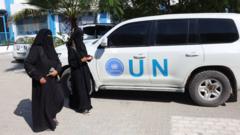In the heart of war-torn Gaza, residents are grappling with an overwhelming humanitarian crisis, and now their situation is poised to worsen significantly due to impending restrictions on the United Nations Relief and Works Agency for Palestine Refugees (UNRWA). Yasmine el-Ashry, a concerned mother from Khan Younis, voiced a common sentiment among Gazans, stating, “Unrwa means everything to us: it is our life, our food, our drink, and our medical care. If it closes, there will be no flour. If my son gets sick, where will I go?”
The situation arises from a new legislative measure gaining traction in the Israeli parliament, which aims to cut off contact between Israeli officials and UNRWA, accusing the agency of collaborating with Hamas. Sharren Haskel, a member of the opposition National Unity Party, asserts, “A terrorist organization has completely taken over it. If the United Nations is not willing to clean this organization from terrorism, then we have to take measures to ensure they cannot harm our people ever again.”
However, UNRWA maintains its commitment to neutrality and warns that if the recent Israeli laws are fully enacted, the humanitarian impact will be severe. Sam Rose, UNRWA’s Gaza deputy director, explains, “It would essentially make it impossible for us to operate in Gaza,” highlighting that without coordination with Israeli officials, vital supplies and services would be impeded, and the safety of staff movements would be significantly endangered.
Despite internal warnings from diplomats and security officials about the ramifications of such actions on humanitarian law, domestic political challenges have taken precedence. Established in the aftermath of the first Arab-Israeli war in 1949, UNRWA currently supports about six million Palestinians across various regions, providing essential services that range from health care to education.
Criticism of UNRWA has intensified in light of events following Hamas's October 2022 attacks, including allegations against some of its staff. Yet, UN officials emphasize that these issues can only be addressed within the context of a broader political resolution to the enduring conflict.
For many Gazans, the potential dismantling of UNRWA’s support structure raises fears of erasing their status as refugees. Mohammed Salman from Deir al-Balah articulated this concern, proclaiming, “They do not want the word refugee. Israel is looking for this.”
With reports indicating that Israeli strikes have resulted in deaths and humanitarian devastation across Gaza, the urgency for sustained international support and advocacy for humanitarian principles has never been clearer. The future remains uncertain for millions, as they cling to hope for necessary aid and stability amidst escalating tensions.












